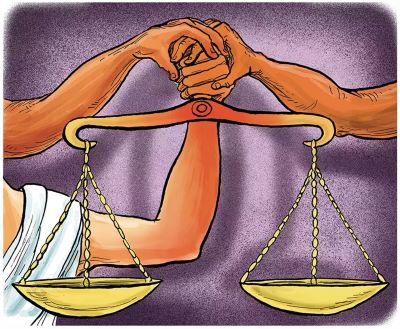Context:
The recent instances of a judge from the Calcutta High Court and a senior IPS officer in West Bengal resigning from their positions to join political parties have reignited discussions about the appropriateness of former judges and senior government officials venturing into politics. This issue raises questions about the boundaries between the judiciary, executive, and political spheres, and the necessity for safeguards to maintain the integrity and independence of these institutions. While the Constitution outlines certain restrictions and guidelines for former officials, there remains a gap in addressing post-retirement political engagements.
Constitutional Restrictions:
The Constitution of India is designed to uphold a system of checks and balances among the various branches of government. It ensures the independence of institutions like the judiciary, Election Commission, and Public Service Commission to prevent undue influence or interference from the executive or legislative branches. These safeguards include fixed tenures, financial autonomy, and stringent removal procedures to maintain institutional integrity. For instance, former Supreme Court judges are barred from practicing law in India after retirement, except before certain courts.
Despite these measures, there are no explicit restrictions on former judges or senior officials joining political parties or contesting elections. This absence of limitations raises concerns about potential conflicts of interest and the perception of impartiality. While the Constitution emphasizes the separation of powers, it does not explicitly address post-retirement political activities, leaving room for ambiguity and debate.
Political Engagements:
In contrast to constitutional restrictions, there are numerous instances of former judges and senior bureaucrats transitioning into political roles or affiliations. This trend underscores the absence of legal barriers and the freedom individuals have to pursue political ambitions post-retirement. Notable examples include Supreme Court judges resigning to contest elections and former election commissioners assuming political office shortly after retirement.
The absence of restrictions on political engagements post-retirement highlights a gap in governance and ethical standards. While individuals have the right to participate in the political process, their prior roles in independent institutions raise concerns about conflicts of interest and impartiality. Without clear guidelines, the risk of favoritism or perceived bias remains a challenge to the integrity of democratic institutions.
Recommendations for Safeguards:
In response to growing concerns, the Election Commission proposed a cooling-off period for senior bureaucrats before they could engage in political activities post-retirement. However, this recommendation was met with resistance from the government, citing constitutional and democratic principles. The Supreme Court also dismissed a petition seeking legislative intervention to impose such a cooling-off period, emphasizing the legislature's prerogative in determining policy in this regard.
Despite these challenges, there is a compelling argument for implementing a cooling-off period to safeguard the integrity of independent institutions and mitigate conflicts of interest. Such a measure would reinforce the principle of independence and neutrality, essential for upholding democratic values. By imposing a temporary hiatus on political engagements post-retirement, former judges and senior officials can uphold public trust and credibility in the democratic process.
The Debate on Cooling-off Period:
While the concept of a cooling-off period has its proponents, it also faces criticism based on democratic principles and individual rights. The Attorney General's opinion against imposing such restrictions underscores the importance of upholding citizens' rights to participate in politics freely. Additionally, existing regulations governing post-retirement employment focus primarily on preventing conflicts of interest in commercial endeavors rather than political engagements.
However, proponents argue that a cooling-off period for political activities is necessary to maintain public confidence in the impartiality and integrity of former officials. By temporarily refraining from political engagements, individuals can demonstrate their commitment to upholding democratic values and preventing perceived bias or favoritism. While balancing individual rights with institutional integrity presents a challenge, implementing safeguards like a cooling-off period could enhance transparency and accountability in post-retirement political activities.
Conclusion:
In conclusion, the issue of former judges and senior government officials joining political parties or contesting elections underscores the delicate balance between democratic principles and institutional integrity. While the Constitution establishes safeguards to maintain the independence of institutions, it falls short in addressing post-retirement political engagements explicitly. The absence of restrictions on such activities raises concerns about conflicts of interest and undermines public trust in democratic institutions.
To address these challenges, there have been proposals for implementing a cooling-off period to prevent immediate transitions from public service to political roles. While this recommendation faces resistance on grounds of individual rights and democratic values, its proponents argue that it is necessary to uphold the impartiality and credibility of former officials. Ultimately, striking a balance between individual freedoms and institutional integrity remains essential in ensuring the continued strength and legitimacy of democratic governance in India.
|
Probable Questions for UPSC Mains Exam 1. Discuss the constitutional provisions and institutional safeguards aimed at preserving the independence of judges and senior government officials in India. Evaluate the effectiveness of these measures in maintaining impartiality and integrity within the democratic framework.(10 marks, 150 words) 2. Analyze the debate surrounding the implementation of cooling-off periods for retired bureaucrats before engaging in political activities. Assess the constitutional principles at stake and examine the implications of such measures on democratic values, institutional integrity, and public perception. (15 marks, 250 words) |
Source – The Hindu







